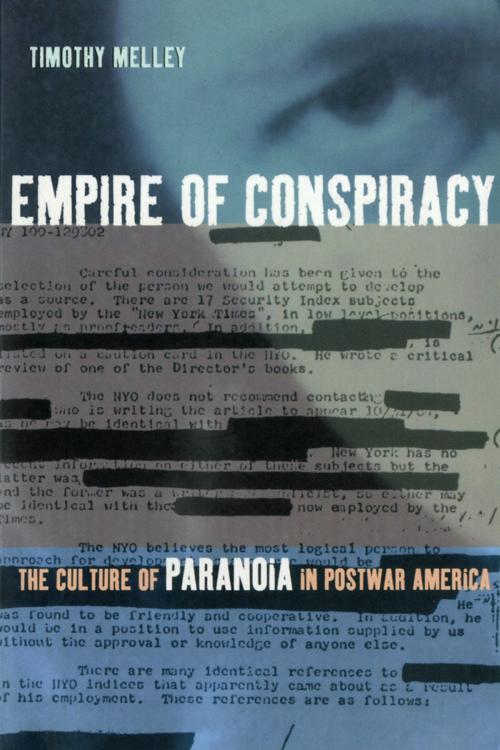Empire of Conspiracy
The Culture of Paranoia in Postwar America
Fiction & Literature, Literary Theory & Criticism, American, Nonfiction, History, Americas, United States, 20th Century, Social & Cultural Studies, Social Science| Author: | Timothy Melley | ISBN: | 9781501713002 |
| Publisher: | Cornell University Press | Publication: | December 1, 2016 |
| Imprint: | Cornell University Press | Language: | English |
| Author: | Timothy Melley |
| ISBN: | 9781501713002 |
| Publisher: | Cornell University Press |
| Publication: | December 1, 2016 |
| Imprint: | Cornell University Press |
| Language: | English |
Why, Timothy Melley asks, have paranoia and conspiracy theory become such prominent features of postwar American culture? In Empire of Conspiracy, Melley explores the recent growth of anxieties about thought-control, assassination, political indoctrination, stalking, surveillance, and corporate and government plots. At the heart of these developments, he believes, lies a widespread sense of crisis in the way Americans think about human autonomy and individuality. Nothing reveals this crisis more than the remarkably consistent form of expression that Melley calls "agency panic"—an intense fear that individuals can be shaped or controlled by powerful external forces. Drawing on a broad range of forms that manifest this fear—including fiction, film, television, sociology, political writing, self-help literature, and cultural theory—Melley provides a new understanding of the relation between postwar American literature, popular culture, and cultural theory.
Empire of Conspiracy offers insightful new readings of texts ranging from Joseph Heller's Catch-22 to the Unabomber Manifesto, from Vance Packard's Hidden Persuaders to recent addiction discourse, and from the "stalker" novels of Margaret Atwood and Diane Johnson to the conspiracy fictions of Thomas Pynchon, William Burroughs, Don DeLillo, and Kathy Acker. Throughout, Melley finds recurrent anxieties about the power of large organizations to control human beings. These fears, he contends, indicate the continuing appeal of a form of individualism that is no longer wholly accurate or useful, but that still underpins a national fantasy of freedom from social control.
Why, Timothy Melley asks, have paranoia and conspiracy theory become such prominent features of postwar American culture? In Empire of Conspiracy, Melley explores the recent growth of anxieties about thought-control, assassination, political indoctrination, stalking, surveillance, and corporate and government plots. At the heart of these developments, he believes, lies a widespread sense of crisis in the way Americans think about human autonomy and individuality. Nothing reveals this crisis more than the remarkably consistent form of expression that Melley calls "agency panic"—an intense fear that individuals can be shaped or controlled by powerful external forces. Drawing on a broad range of forms that manifest this fear—including fiction, film, television, sociology, political writing, self-help literature, and cultural theory—Melley provides a new understanding of the relation between postwar American literature, popular culture, and cultural theory.
Empire of Conspiracy offers insightful new readings of texts ranging from Joseph Heller's Catch-22 to the Unabomber Manifesto, from Vance Packard's Hidden Persuaders to recent addiction discourse, and from the "stalker" novels of Margaret Atwood and Diane Johnson to the conspiracy fictions of Thomas Pynchon, William Burroughs, Don DeLillo, and Kathy Acker. Throughout, Melley finds recurrent anxieties about the power of large organizations to control human beings. These fears, he contends, indicate the continuing appeal of a form of individualism that is no longer wholly accurate or useful, but that still underpins a national fantasy of freedom from social control.















